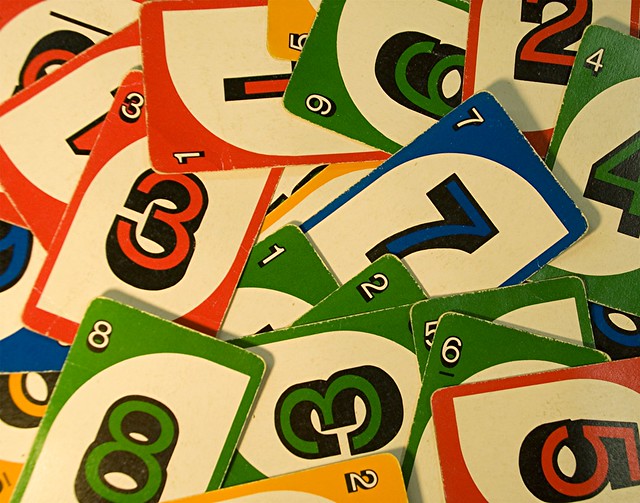
For many reasons, I've been fascinated with card games that can be played with little more than a deck of sequentially numbered cards. Sometimes there are colors acting as perfunctory suits, like Uno or Reiner Knizia's Poison. The real gems are games like No Thanks or 6 Nimmt which have no suits, just numbers. There's something so seductive about the pure abstraction there.
On that note, dice games are heavy hitters when it comes to abstract purity – Yahtzee and Liars' Dice come to mind. Heck, even dice games with custom faces can be abstracted back down to algebraic notation... but let's talk about cards for now.
I must admit, part of the appeal is from a commercial perspective. Cards-with-numbers are easy to playtest, easy to lay out, require minimal art, and can be reproduced relatively easily. I think this creates a positive pressure on the design of the game itself. The mechanics and rules presentation must be well-executed since the components could be created at home with little trouble.
And that's why I've been orbiting around so many cards-with-numbers ideas lately. I'm looking at games like Stefan Dorra's For Sale, where cards are auctioned then used as bidding. I'm looking at Libertalia, where cards determine which special effect is activated first. I'm looking at Get Bit, where the cards are used for bluffing and deduction. In these games and others, a simple cards-with-numbers deck forms the slim, strong rebar supporting a robust game.
In a fit of frustration, I tweeted this ultra-minimal idea.
Idea: Spread number cards on a table. Players take turns taking one card. Turn order=Previous round's chosen cards, low-to-high. Score=Sum.
— Daniel Solis (@DanielSolis) November 4, 2012
This sounds really appealing at first glance. It's essentially self-balancing, with power-grabs mitigated by poor turn order in the later rounds.
But of course that just leads to the last round not really mattering. The "winner" would be determined by the turn order established in the previous round. Continuing this all the way backwards, the first round's turn order would essentially predict the endgame's winner or the final score would essentially be a tie. (Thanks to Mark Sherry for pointing this out.)
Granted, that projection is based on averages and random draws. People can be unpredictable, but with this sort of bug, you only win if your opponent makes a mistake. If everyone plays perfectly, the game simply ends in a tie.
However, if this formed the "rebar" of another game, it might be useful. Say you're trying to straights or all evens or all primes. When you toss in other information on the cards, you get even more opportunities for set-building. (I like how 6 Nimmt puts bulls on key cards in a regular pattern, so that some the pattern occasionally lines up so some have two bulls, some have three, and so on. It feels like a constellation.)
How about this:
- Spread the numbered cards across the table, 5 per player. (If there are 3 players, there are 15 cards on the table, each numbered 1-15.)
- Players take turns taking one card, then moving up the score track that many points.
- The turn order of each round proceeds from the trailing player, up to the leading player.
- Straights are worth the lowest number in the set. So a 2 3 4 5 6 is only worth 2 points. Thus, if you see an opponent has a 2 3 and a 5 6, you really want to force them to take the 4.
- There are enough cards to play through 5 rounds. After that, the player with the highest score wins.
Even when there is a bug in a cards-with-numbers game, you can design around it to make something more substantial and satisfying.
Anyway, my quest for designing a cards-with-numbers game continues. Do you have any favorite cards-with-numbers games?
No comments:
Post a Comment